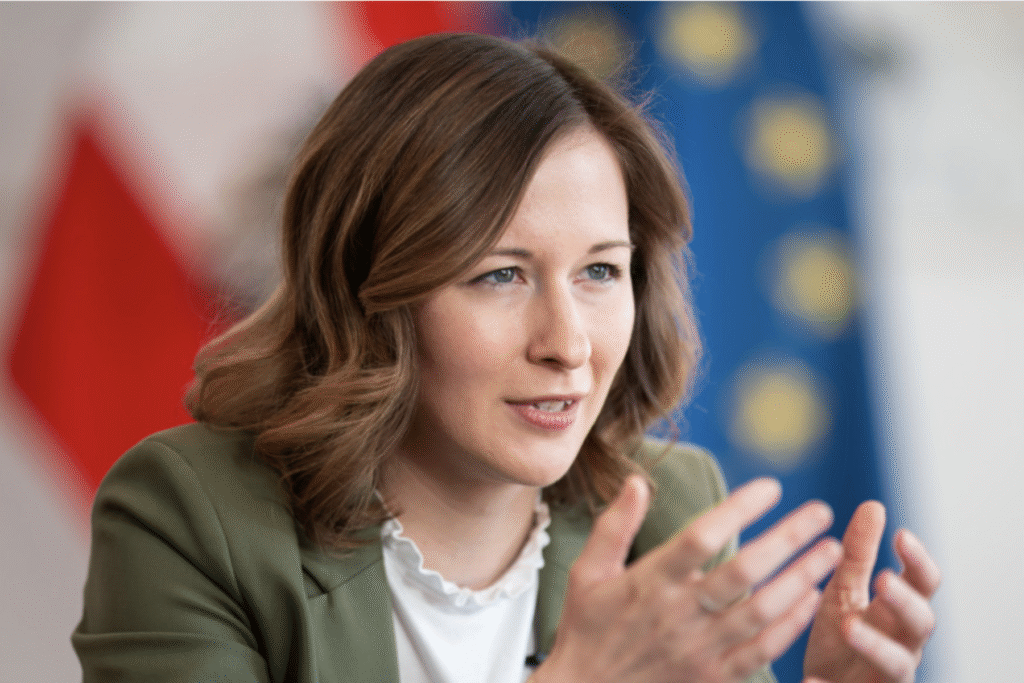
According to the responsible minister Claudia Plakolm (ÖVP), “voluntariness in integration is now over.” The amount of support during a mandatory integration program will be tied to willingness to integrate, while Ukrainian families’ child benefits will be linked to willingness to work. The planned headscarf ban, she added, is for the Minister of Integration, Family, and EU Affairs less a matter of religion than of child welfare, she said in an APA interview.
The three-year mandatory integration program is to be linked with the social welfare reform scheduled for the fall. It will apply to asylum seekers and beneficiaries of subsidiary protection, displaced persons, as well as asylum applicants with a high likelihood of being allowed to stay. Anyone who, for example, unjustifiably skips German or values courses or does not report to the Public Employment Service (AMS) will face “clear reductions” in the integration allowance received during that period. According to Plakolm, this is not about expanding the budget: asylum numbers have fallen significantly, and there are already problems with repeat enrollments and empty seats in courses.
For displaced persons from Ukraine, entitlement to family allowance remains until October 31. A follow-up arrangement, Plakolm said, will be negotiated as quickly as possible. Entitlement will then be linked to willingness to work, as displaced persons are permitted to work from day one. In any follow-up arrangement, individual life situations—such as childcare responsibilities—would be taken into account, she said when asked whether special provisions might apply for people with very young children.
Headscarf ban a matter of child welfare, not religion, says Plakolm
The headscarf ban in schools for girls under 14 is also scheduled for the fall. There will be accompanying measures: girls are to be empowered, discussions with parents will take place, and school psychologists, child and youth services, and children’s advocates may be brought in. The final sanctions for girls who refuse to remove their headscarves are still under discussion.
In 2020, the Constitutional Court struck down the first headscarf ban, partly on the grounds that the measure targeted only Muslims. “For me it is clear this is a child welfare issue,” said Plakolm. “It has less of a religious background for me, because a headscarf has no place for under-14s.” She added that it is not a requirement in Islam either.
On social media platforms, more “European-level control” is needed, particularly for age verification. Plakolm would not commit to a minimum age for use, saying a unified European line was first needed. She also called for tougher action at the EU level against platforms’ insufficient content moderation: “Everything that is prohibited in real life must also be sanctioned in the digital space.”
“Open to debate” on social egg freezing
Unlike Women’s Minister Eva-Maria Holzleitner (SPÖ), Plakolm said she could not imagine a legal requirement for parents to split parental leave 50-50. The possibility already exists, she said, and parents know best what is right for their children. A working group is to develop proposals by the end of 2026, including incentives for greater involvement of fathers. Plakolm suggested measures that would make it more attractive for employers to allow people in leadership positions longer leave and provide better work-life balance.
On the topic of “social egg freezing,” Plakolm said she was “very open to debate.” Currently, freezing eggs for later fertilization is only allowed for medical reasons. However, the Constitutional Court could overturn this ban after a June hearing. “Any measure that helps us have more children,” she said, “is worth debating.”
Asked about the war in Ukraine and Hungary’s frequent deviation from EU consensus, the EU Minister argued for a focus on peace and a united European front. Within Europe, she said, it makes no sense “to publicly point fingers at individual member states and announce in the media what we think of their domestic policies.” As Austria borders Hungary, she said, the country has an important mediating role; developments she disagreed with, she would address bilaterally.

